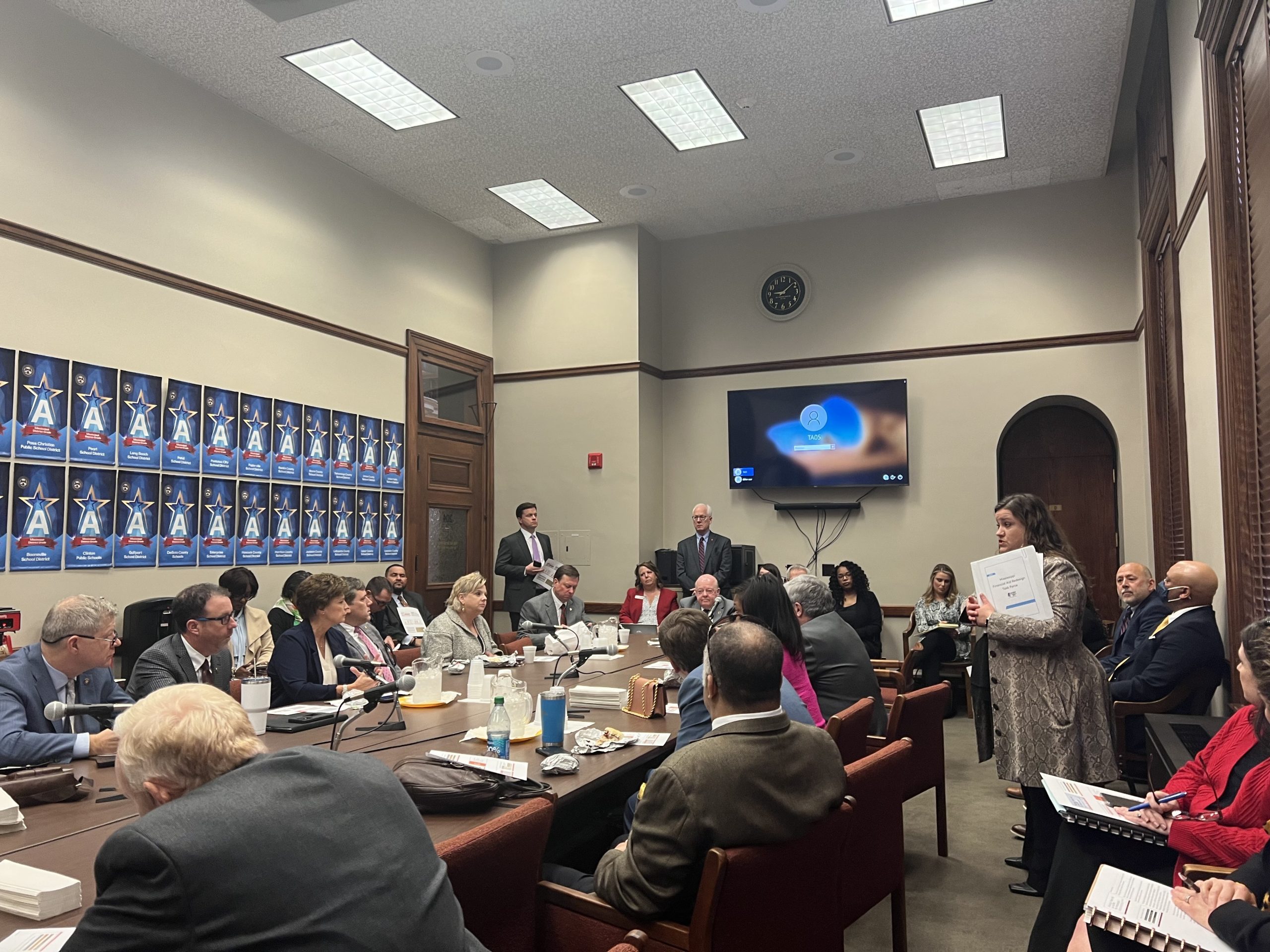Mississippi Today
As lawmakers hear proposal to redesign financial aid, education policy experts say it’s a ‘bad idea’
As lawmakers hear proposal to redesign financial aid, education policy experts say it’s a ‘bad idea’
A proposal that would substantially overhaul how the state doles out money to help Mississippians pay for college was presented to a joint hearing of lawmakers on Tuesday.
Jennifer Rogers, the director of the Office of Student Financial Aid, told lawmakers that she does not believe a “perfect plan” exists, but she can’t think of a proposal that has consensus and “would advance the state more than this one does.”
She credited this support to the closed-door task force that created the proposal. Last year, the Woodward Hines Education Foundation, a nonprofit, invited public officials from higher education and workforce development to participate with the goal of redesigning state financial aid. Student recipients of state financial aid were not invited to attend.
If the wide-ranging proposal becomes law, it would be the first time that lawmakers have updated Mississippi’s undergraduate grant aid programs since they were created in the late 1990s. The committees plan to consider two identical bills based on this proposal later this week.
Rep. Donnie Scoggin, R-Ellisville, the vice-chairman of the House Colleges and Universities Committee, said the goal of the bill is “simply to try to get more people into the workforce.”
He speculated Tuesday’s meeting was the first time the House and Senate committees ever held a joint meeting, signaling broad legislative support for this year’s proposal after prior efforts to redesign state financial aid have failed to get off the ground.
The Mississippi Eminent Scholars Grant (MESG), the state’s only merit-based program with the primary purpose of rewarding academic achievement — and the most racially inequitable program — is the only state aid program that would remain untouched. The task force didn’t propose changes to MESG, Rogers told the committee, recognizing it has “broad political support.”
The bill seeks to reduce the amount of money that Mississippi spends on its only grant aimed at helping low-income students afford college — the Higher Education Legislative Plan for Needy Students, or HELP grant — while expanding the Mississippi Resident Assistance Tuition Grant (MTAG).
It proposes kicking an additional $18 million in state funds to MTAG but lowering spending on the HELP grant by $7 million.
As written, the bills would reduce awards made under the HELP grant, which currently pays for all four years of college, no matter the institution a recipient chooses to attend. Officials are continuing to target spending on the HELP grant even though the cost, which had been increasing over the last decade, appears to be reaching a cliff, according to OSFA’s annual report this year.
HELP recipients, by and large, choose to spend the generous grant at four-year universities, not community colleges. The growing cost of tuition at the universities is one reason why the state spends the most money on this grant each year. But the bills’ changes aim to push more recipients toward community college by turning the HELP grant into what’s commonly called a “2+2 program.”
Awards for freshmen and sophomores would be lowered to the average cost of tuition at the community colleges, even if recipients decide to attend a four-year university. Juniors and seniors would receive the average cost of university tuition, an attempt to encourage them to transfer.
This way, the HELP grant would have reduced buying power at the universities, increasing the likelihood that low-income students would initially choose community colleges as the more affordable option.
While this move would save the state of Mississippi money, education policy experts told Mississippi Today that it also likely means the rate at which low-income recipients graduate from public universities would plummet.
Nationally, just 1 in 6 community college students successfully transfer to universities.
“Cutting HELP in a way that directs talented low-income students to community colleges is definitely problematic,” said Sandy Baum, a fellow at the Urban Institute who has studied Mississippi’s state financial aid policies.
Scoggin acknowledged that with the changes, HELP recipients “may very well just stay at the community college and not transfer” to university but he speculated that would depend on a student’s degree field.
Philip Bonfanti, the executive vice president of Mississippi Gulf Coast Community College and a member of the task force, said that he believes Mississippians transfer out of community college at a higher rate than the national average.
According to federal data, MGCCC’s transfer-out rate is 11% — less than the national average.
Bonfanti emphasized the changes to HELP are fiscally responsible. HELP students who wanted to go directly to university could supplement the new, lowered award amount with the Pell Grant or institutional or private scholarships.
“No student loses access to higher education because of this proposed change,” he said, “but it almost cuts the HELP program in half.”
Rep. Lataisha Jackson, D-Como, asked if the task force considered lowering the ACT requirement to the state average of 17 so more students could qualify. Right now, HELP recipients have to get at least a 20.
“I don’t think there was any objection to it,” Bonfanti replied. “I think it was a monetary decision.”
Lawmakers also discussed the proposed changes to MTAG.
The number of students served by MTAG would increase from 17,000 to 34,000, according to HCM Strategists, a consulting firm hired by Woodward Hines to assist the task force.
Under the bills, eligibility for MTAG would broaden so that Pell Grant recipients would no longer be excluded by statute, part-time students could qualify, and the requirement of a 15 or higher on the ACT would be dropped.
Award amounts would increase to $1,000 for community college students and $2,000 for university students.
Sen. John Polk, R-Hattiesburg, asked if it was fair to MESG recipients for MTAG awards to increase.
“So if you’re an Eminent Scholar, you only get $500 more than a student that breathes air,” he said, referring to the accessible requirements for MTAG. “We’re trying to keep Eminent Scholars in Mississippi.”
“I think it looks a little awkward,” he added.
MTAG would also be retooled in an effort to incentivize students to pick degrees that serve the state’s workforce needs as identified by Accelerate MS. Students who choose “high value pathways” would receive a $500 bonus.
Toren Ballard, K-12 policy director for Mississippi First, said the bills would result in a “huge shift” in resources away from lower-income students.
Ballard added that MTAG is not an efficient use of state resources, citing one study requested by the Office of Student Financial Aid that showed the grant does not have a statistically significant impact on if students obtain a college degree.
“At the end of the day, HELP is need-based, MESG is merit-based,” he said. “We can argue about which one of those should take precedence. But MTAG is nothing-based. It’s a hand out. That’s all it is.”
An extra $500 is likely not enough money to change students’ behavior, said Baum, the Urban Institute fellow.
“The idea that students will change their degree programs for $500 is questionable to begin with — and probably a bad idea,” she said.
Baum added that the state’s priorities of increasing educational attainment to 55% by 2030 are undercut by the lack of changes to MESG.
“In order to be more effective in increasing educational attainment, the system would have to stop showing so much favor to high-achieving students,” she said. “But I guess that is unlikely to happen any time soon.”
Editor’s note: The Woodward Hines Education Foundation is a Mississippi Today donor.
This article first appeared on Mississippi Today and is republished here under a Creative Commons license.
Did you miss our previous article…
https://www.biloxinewsevents.com/?p=205070
Mississippi Today
Hospitals see danger in Medicaid spending cuts
Mississippi hospitals could lose up to $1 billion over the next decade under the sweeping, multitrillion-dollar tax and policy bill President Donald Trump signed into law last week, according to leaders at the Mississippi Hospital Association.
The leaders say the cuts could force some already-struggling rural hospitals to reduce services or close their doors.
The law includes the largest reduction in federal health and social safety net programs in history. It passed 218-214, with all Democrats voting against the measure and all but five Republicans voting for it.
In the short term, these cuts will make health care less accessible to poor Mississippians by making the eligibility requirements for Medicaid insurance stiffer, likely increasing people’s medical debt.
In the long run, the cuts could lead to worsening chronic health conditions such as diabetes and obesity for which Mississippi already leads the nation, and making private insurance more expensive for many people, experts say.
“We’ve got about a billion dollars that are potentially hanging in the balance over the next 10 years,” Mississippi Hospital Association President Richard Roberson said Wednesday during a panel discussion at his organization’s headquarters.
“If folks were being honest, the entire system depends on those rural hospitals,” he said.
Mississippi’s uninsured population could increase by 160,000 people as a combined result of the new law and the expiration of Biden-era enhanced subsidies that made marketplace insurance affordable – and which Trump is not expected to renew – according to KFF, a health policy research group.
That could make things even worse for those who are left on the marketplace plans.
“Younger, healthier people are going to leave the risk pool, and that’s going to mean it’s more expensive to insure the patients that remain,” said Lucy Dagneau, senior director of state and local campaigns at the American Cancer Society.
Among the biggest changes facing Medicaid-eligible patients are stiffer eligibility requirements, including proof of work. The new law requires able-bodied adults ages 19 to 64 to work, do community service or attend an educational program at least 80 hours a month to qualify for, or keep, Medicaid coverage and federal food aid.
Opponents say qualified recipients could be stripped of benefits if they lose a job or fail to complete paperwork attesting to their time commitment.
Georgia became the case study for work requirements with a program called Pathways to Coverage, which was touted as a conservative alternative to Medicaid expansion.
Ironically, the 54-year-old mechanic chosen by Georgia Gov. Brian Kemp to be the face of the program got so fed up with the work requirements he went from praising the program on television to saying “I’m done with it” after his benefits were allegedly cancelled twice due to red tape.
Roberson sent several letters to Mississippi’s congressional members in weeks leading up to the final vote on the sweeping federal legislation, sounding the alarm on what it would mean for hospitals and patients.
Among Roberson’s chief concerns is a change in the mechanism called state directed payments, which allows states to beef up Medicaid reimbursement rates – typically the lowest among insurance payors. The new law will reduce those enhanced rates to nearly as low as the Medicare rate, costing the state at least $500 million and putting rural hospitals in a bind, Roberson told Mississippi Today.
That change will happen over 10 years starting in 2028. That, in conjunction with the new law’s one-time payment program called the Rural Health Care Fund, means if the next few years look normal, it doesn’t mean Mississippi is safe, stakeholders warn.
“We’re going to have a sort of deceiving situation in Mississippi where we look a little flush with cash with the rural fund and the state directed payments in 2027 and 2028, and then all of a sudden our state directed payments start going down and that fund ends and then we’re going to start dipping,” said Leah Rupp Smith, vice president for policy and advocacy at the Mississippi Hospital Association.

Even with that buffer time, immediate changes are on the horizon for health care in Mississippi because of fear and uncertainty around ever-changing rules.
“Hospitals can’t budget when we have these one-off programs that start and stop and the rules change – and there’s a cost to administering a program like this,” Smith said.
Since hospitals are major employers – and they also provide a sense of safety for incoming businesses – their closure, especially in rural areas, affects not just patients but local economies and communities.
U.S. Rep. Bennie Thompson is the only Democrat in Mississippi’s congressional delegation. He voted against the bill, while the state’s two Republican senators and three Republican House members voted for it. Thompson said in a statement that the new law does not bode well for the Delta, one of the poorest regions in the U.S.
“For my district, this means closed hospitals, nursing homes, families struggling to afford groceries, and educational opportunities deferred,” Thompson said. “Republicans’ priorities are very simple: tax cuts for (the) wealthy and nothing for the people who make this country work.”
While still colloquially referred to as the One Big Beautiful Bill Act, the name was changed by Democrats invoking a maneuver that has been used by lawmakers in both chambers to oppose a bill on principle.
“Democrats are forcing Republicans to delete their farcical bill name,” Senate Democratic Leader Charles Schumer of New York said in a statement. “Nothing about this bill is beautiful — it’s a betrayal to American families and it’s undeserving of such a stupid name.”
The law is expected to add at least $3.3 trillion to the nation’s debt over the next 10 years, according to the most recent estimate from the Congressional Budget Office.
This article first appeared on Mississippi Today and is republished here under a Creative Commons Attribution-NoDerivatives 4.0 International License.
The post Hospitals see danger in Medicaid spending cuts appeared first on mississippitoday.org
Note: The following A.I. based commentary is not part of the original article, reproduced above, but is offered in the hopes that it will promote greater media literacy and critical thinking, by making any potential bias more visible to the reader –Staff Editor.
Political Bias Rating: Center-Left
This article reports on the negative impacts of a major federal tax and policy bill on Medicaid funding and rural hospitals in Mississippi. While it presents factual details and statements from stakeholders, the tone and framing emphasize the harmful consequences for vulnerable populations and health care access, aligning with concerns typically raised by center-left perspectives. The article highlights opposition by Democrats and critiques the bill’s priorities, particularly its effect on poor and rural communities, suggesting sympathy toward social safety net preservation. However, it maintains mostly factual reporting without overt partisan language, resulting in a moderate center-left bias.
Crooked Letter Sports Podcast
Podcast: The Mississippi Sports Hall of Fame Class of ’25
The MSHOF will induct eight new members on Aug 2. Rick Cleveland has covered them all and he and son Tyler talk about what makes them all special.
Stream all episodes here.
This article first appeared on Mississippi Today and is republished here under a Creative Commons Attribution-NoDerivatives 4.0 International License.
The post Podcast: The Mississippi Sports Hall of Fame Class of '25 appeared first on mississippitoday.org
Mississippi Today
‘You’re not going to be able to do that anymore’: Jackson police chief visits food kitchen to discuss new public sleeping, panhandling laws
Diners turned watchful eyes to the stage as Jackson Police Chief Joseph Wade took to the podium. He visited Stewpot Community Services during its daily free lunch hour Thursday to discuss new state laws, which took effect two days earlier, targeting Mississippians experiencing homelessness.
“I understand that you are going through some hard times right now. That’s why I’m here,” Wade said to the crowd. “I felt it was important to come out here and speak with you directly.”
Wade laid out the three bills that passed earlier this year: House Bill 1197, the “Safe Solicitation Act,” HB 1200, the “Real Property Owners Protection Act” and HB 1203, a bill that prohibits camping on public property.
“Sleeping and laying in public places, you’re not going to be able to do that anymore,” he said. “There’s a law that has been passed that you can’t just set up encampments on public or private properties where it’s a public nuisance, it’s a problem.”
The “Real Property Owners Protection Act,” authored by Rep. Brent Powell, R-Brandon, is a bill that expedites the process of removing squatters. The “Safe Solicitation Act,” authored by Rep. Shanda Yates, I-Jackson, requires a permit for panhandling and allows people to be charged with a misdemeanor if they violate this law. The offense is punishable by a fine not to exceed $300 and an offender could face up to six months in jail. Wade said he’s currently working with his legal department to determine the best strategy for creating and issuing permits.
“We’re going to navigate these legal challenges, get some interpretations, not only from our legal department, but the Attorney General’s office to ensure that we are doing it legally and lawfully, because I understand that these are citizens,” he said. “I understand that they deserve to be treated with respect, and I understand that we are going to do this without violating their constitutional rights.”
Wade said the Jackson Police Department is steadily fielding reports of squatters in abandoned properties and the law change gives officers new power to remove them more quickly. The added challenge? Figuring out what to do with a person’s belongings.
“These people are carrying around what they own, but we are not a repository for all of their stuff,” he said. “So, when we make that arrest, we’ve got to have a strategic plan as to what we do with their stuff.”
Wade said there needs to be a deeper conversation around the issues that lead someone to becoming homeless.
“A lot of people that we’re running across that are homeless are also suffering from medical conditions, mental health issues, and they’re also suffering from drug addiction and substance abuse. We’ve got to have a strategic approach, but we also can’t log jam our jail down in Raymond,” Wade said.
He estimates that more than 800 people are currently incarcerated at the Raymond Detention Center, and any increase could strain the system as the laws continue to be enforced.
“I think there’s layers that we have to work through, there’s hurdles that we are going to overcome, but we’ve got to make sure that we do it and make sure that my team and JPD is consistent in how we enforce these laws,” Wade said.
Diners applauded Wade after he spoke, in between bites of fried chicken, salad, corn and 4th of July-themed packaged cakes. Wade offered to answer questions, but no one asked any.
Rev. Jill Buckley, executive director of Stewpot, said that the legislation is a good tool to address issues around homelessness and community needs. She doesn’t want to see people who are homeless be criminalized, but she also wants communities to be safe.
“I support people’s right to self determine, and we can’t impose our choices on other people, but there are some cases in which that impinges on community safety, and so to the extent that anyone who is camping or panhandling or squatting and is a danger to themselves and others, of course, I fully support that kind of law. I don’t support homelessness being criminalized as such,” Buckley said.

Many of the people Wade addressed while they ate Thursday said they have housing, don’t panhandle, and shouldn’t be directly impacted by the legislation. But Marcus Willis, 42, said it would make more sense if elected officials wanted to combat the negative impacts of homelessness that they help more people secure employment.
“There ain’t enough jobs,” said Willis, who was having lunch with his girlfriend Amber Ivy.
The two live in an apartment together nearby on Capitol Street, where Ivy landed after her mother, whom Ivy had been living with, suffered a stroke and lost the property. Similarly, Willis started coming to eat at Stewpot after his grandmother, whose house he used to visit for lunch, passed away.
Willis holds odd jobs – cutting grass, home and auto repair – so the income is inconsistent, and every opportunity for stable employment he said he’s found is outside of Jackson in the suburbs. The couple doesn’t have a car.
Making rent every month usually depends on their ability to find someone to help chip in, said Ivy, who is in recovery from substance abuse. She said she’s watched problems surrounding homelessness grow over the years in Jackson. Ivy grew up near Stewpot and has lived in various neighborhoods across the city – except for the times she moved out of state when things got too rough.
“There was just moments where I just had to leave,” Ivy said. “Sometimes if you hit a slump here, there’s almost no way for you to get out of it.”
This article first appeared on Mississippi Today and is republished here under a Creative Commons Attribution-NoDerivatives 4.0 International License.
The post 'You're not going to be able to do that anymore': Jackson police chief visits food kitchen to discuss new public sleeping, panhandling laws appeared first on mississippitoday.org
Note: The following A.I. based commentary is not part of the original article, reproduced above, but is offered in the hopes that it will promote greater media literacy and critical thinking, by making any potential bias more visible to the reader –Staff Editor.
Political Bias Rating: Center-Right
This article primarily reports on new laws in Jackson, Mississippi, targeting public sleeping, panhandling, and squatting, focusing on statements by Police Chief Joseph Wade and community perspectives. The coverage presents the legislative measures—authored by Republican and independent lawmakers—with a tone that emphasizes law enforcement challenges and community safety, reflecting a conservative approach to homelessness as a public order issue. While it includes voices concerned about criminalization and the need for social support, the overall framing centers on law enforcement and property protection. The article maintains factual reporting without overt editorializing but leans slightly toward a center-right perspective by highlighting legal enforcement as a solution.
-
News from the South - Georgia News Feed7 days ago
'Big Beautiful Bill' already felt at Georgia state parks | FOX 5 News
-
The Center Square5 days ago
Here are the violent criminals Judge Murphy tried to block from deportation | Massachusetts
-
News from the South - Kentucky News Feed5 days ago
Woman arrested in Morgantown McDonald’s parking lot
-
The Center Square7 days ago
Alcohol limits at odds in upcoming dietary guidelines | National
-
News from the South - Texas News Feed6 days ago
Hill Country flooding: Here’s how to give and receive help
-
News from the South - North Carolina News Feed6 days ago
Raleigh caps Independence Day with fireworks show outside Lenovo Center
-
News from the South - Missouri News Feed7 days ago
Shannon County Sheriff alleges ‘orchestrated campaign of harassment and smear tactics,’ threats to life
-
Our Mississippi Home7 days ago
The Other Passionflower | Our Mississippi Home



















































